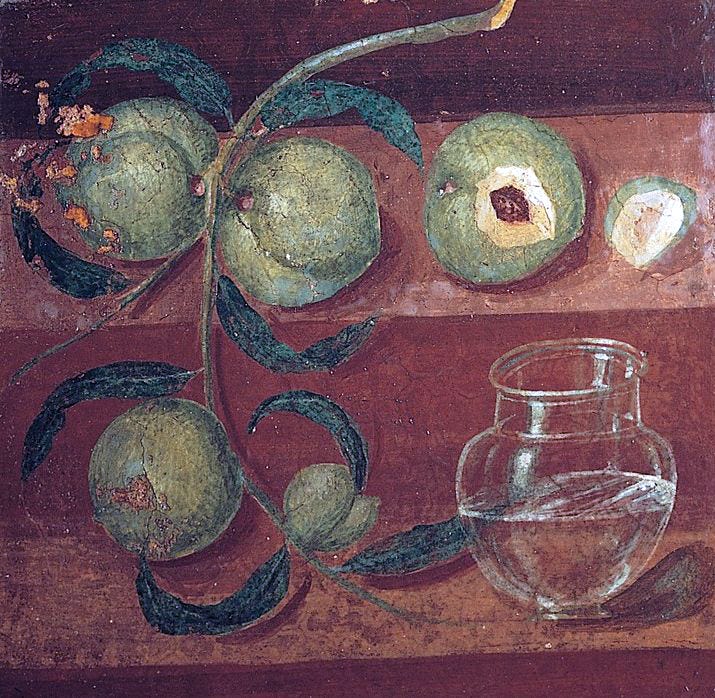TW: Mention of death in natural disaster (not graphically illustrated)
This rather colloquial poem was inspired by a remarkable painting, dating from around 79CE. It was found by archaeologists on the wall of a splendid villa in Herculaneum, and could well have been finished just days before the eruption of Vesuvius that destroyed both Herculaneum and Pompeii.The subject wasn’t entirely my own idea; it was featured as a writing prompt by
in her Substack Notes From The Margin. And that is precisely what it is, a little footnote caught up in the currents of time, fairly typical of the elaborate wall decorations favoured by the Pompeian elite in their homes at that period. The depiction of the delicacies offered to those lucky enough to receive an invitation to a banquet here are standard enough, except for one thing - who would want to eat clearly unappetising unripe peaches?There’s a story there, I thought, and sat down to write it. I often think of the “little people” who kept society going when I watch programmes about archaeological digs - what did they think of everything going on around them? This particular excavation revealed a very poignant find, the skeletons of two women crouched over a small child, as if to comfort her, in a bare, almost windowless room. How terrified they must have been when they found the air choked, and their exit blocked, by ash. At least the wealthy would have had some chance of escape, although as we know, plenty of their remains have been found, too.
Writing inspired by artworks is called ekphrastic writing, and still lives are a great subject for it, since it is relatively easy to imagine the scene beyond the arbitrary borders of the picture and the people who might have inhabited it. But, although Wendy’s new course in ekphrastic writing is excellent, as indeed are all her offerings, and well worth the subscription, I think a closer ancestor of this particular poem was probably WH Auden’s “Museé de Beaux Arts”, which was itself inspired by this remarkable painting:
But I digress (somewhat). Here is my poem:
THE MURAL PAINTER’S LAST MASTERPIECE
Herculaneum, 62-69CE
No, the peaches must be green
The lady of the house is having none of it,
And she’s the kind who’ll always get her way
***
What do I know, merely an artist,
Little more than a slave?
***
She doesn’t care for red, apparently
First person I ever encountered
To object to that auspicious colour,
Plastered all over the house –
Well, excepting the slaves’ quarters, naturally.
***
This nouveau-riche matron’s so full of herself
That she’ll be demanding purple next.
Look at me, the red cries out, look, look – I’ve arrived.
Here, in my palace of pleasure
You’ll feast on grapes and leverets
Slippery eel, mussels, squid – you’ll want for nothing here,
But first you’ll have to get through the door.
***
Is it that she just doesn’t like peaches?
Or doesn’t like him?
Does she hope that the sight of them un-ripened
Like a virgin’s buttock
Sets his harlot’s teeth on edge?
***
Wouldn’t surprise me one sesterce,
If this time next week, I’m back in here,
While she’s out making sacrifices to some deity
Or visiting her mother,
And he’ll have me painting them over in gold.
But why should I care, if the money’s good?
***
I rock back on my knees,
Wipe my sweating forehead with a rag,
And take a swig of sour wine to restore me.
Not a breath of air this morning.
Propped the door open, but it didn’t help.
I left just a touch of the garden behind me,
Reflected in a curve of glass,
More than enough green for most.
***
At least they aren’t overlooking that mountain,
I don’t quite know why but it gives me the creeps.
Just these last few days
They’ve had to recall the builders twice
To fix cracks in the new-laid flooring,
Gods, you should have heard the master rage
As if we humble artisans,
Can rule the shudders of the earth.
***
Baker just called,
That bread smells good,
Better roll my brushes up and be away
Before it tempts me,
Before she turns up and starts complaining about something else.
They don’t know they’re born these folks,
***
But who thinks of the slaves huddled up with their kids,
Two, three to a bed in a windowless room,
Ash choking the lungs,
And piled high beyond a door that will not open?




